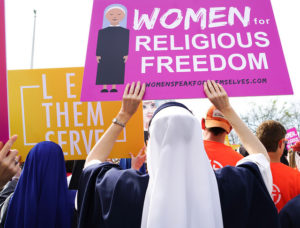
FDA issues heightened standards for antibody tests, the Department of Justice announces first arrests for COVID-19 emergency lending fraud, and more…
IN THE NEWS
- The U.S. Food and Drug Administration (FDA) recently announced a new policy that calls for heightened standards for laboratories and commercial manufacturers to increase the development and availability of COVID-19 antibody tests. Under the new policy, companies that produce antibody tests should meet minimum quality measures, as well as submit an emergency use authorization request for temporary FDA approval of the product before it enters the market. Prior to these stricter guidelines, FDA permitted manufacturers to make antibody tests available without FDA authorization, prompting some public officials to argue that such voluntary compliance increases the potential for fraudulent tests on the market.
- The U.S. Department of Justice announced the first arrests in its investigation of fraud by applicants for various emergency business loans intended to help respond to the coronavirus pandemic. A top official reportedly disclosed that the agency is casting a wide net in the investigation, including inquiries into individuals, businesses, and banks in connection with programs such as the $660 billion Paycheck Protection Program. Days after Treasury Secretary Steven Mnuchin pledged to review any loan in excess of $2 million, Justice Department Assistant Attorney General Brian A. Benczkowski reportedly said that the Department “has a lot of leads and there are multiple ongoing investigations of individuals and small businesses.”
- In recent guidance on disinfecting public and private facilities amid COVID-19, the U.S. Environmental Protection Agency (EPA) advised the public to use alternative disinfectants, such as 70 percent alcohol solutions and bleach products, that are not EPA-approved if registered cleaning solutions are not available. The guidance comes amid continued shortages of disinfectant products due to increased demand from consumers seeking to protect themselves from the coronavirus. In addition to advising the public on the safe use of unregistered disinfectants, EPA has also expedited requests for product reviews and approval to meet the demands for disinfectant products, which have increased by 144 percent since the start of the pandemic.
- The U.S. Supreme Court rejected a request for a stay of the executive order requiring “non-life-sustaining” businesses to suspend physical operations, which Pennsylvania Governor Tom Wolf issued in late March in response to the coronavirus. The petitioners, a group of Pennsylvania businesses, claimed that the order is causing “substantial, unprecedented damage to the economy” while violating their constitutional rights. The Court denied the petitioners’ request to suspend the order without comment or any apparent dissent.
- As the U.S. Senate resumed in-person business this week, the U.S. Department of Health and Human Services offered to send 1,000 tests and three Abbott point-of-care testing machines for use in screening public officials. Majority Leader Mitch McConnell (R-Ky.) and House Speaker Nancy Pelosi (D-Calif.), however, declined the agency’s offer in a joint statement, explaining instead that the U.S. Congress “wants to keep directing resources to front-line facilities.” The Senate will follow guidance from the Centers for Disease Control and Prevention, as well as from attending physician Brian Monahan, who advised senators to take their temperature before arriving at Capitol Hill, avoid workplace gatherings, and adjust office layouts, among other recommended social distancing procedures.
- A workers’ advocacy group alleging unsafe conditions at a meatpacking plant in Missouri must bring their claims to the Occupational Safety and Health Administration (OSHA), a federal court said when dismissing a complaint filed by the group. The nonprofit group alleged that Smithfield Foods, Inc. had failed to protect workers amid COVID-19 by operating “in direct contravention of CDC guidelines” about personal protective equipment, social distancing, hand-washing, sick leave, and contract tracing. Denying the group’s emergency request to order Smithfield to comply with federal safety guidance, the court held that under the so-called primary-jurisdiction doctrine, the claim must be resolved first by OSHA. Plaintiffs’ counsel David Muraskin reportedly said that any improvements at Smithfield so far are thanks to “the courageous workers who came forward to demand better from the company.”
- For the third time, the U.S. Supreme Court heard oral arguments in a case involving Trump Administration rules that exempt employers from providing their employees with free contraceptive coverage through employer-sponsored health insurance plans if the employers have moral or religious objections. The Trump Administration rules push back on the Patient Protection and Affordable Care Act’s contraceptive coverage mandate, which requires all individual and employer health plans to offer reproductive coverage without cost sharing. Employers requesting exemption argue that without the exemption the mandate violates their religious liberties, but opponents of the Trump-era regulations assert that these exemptions place an undue burden on women. If the Court upholds the regulations, over 126,000 women could lose contraceptive coverage.
- The U.S Department of Education’s newly finalized Title IX rule clarifies the definition of “sexual harassment,” affirms rights such as notice of allegations to accused assailants, and permits schools to choose between different evidential standards in resolving complaints. According to Education Secretary Betsy DeVos, the rule requires schools “to support survivors of sexual misconduct, without sacrificing important safeguards to ensure a fair and transparent process.” Emily Martin of the National Women’s Law Center reportedly criticized the rule for violating the Administrative Procedure Act and failing to account for evidence that certain provisions of the rule “would harm survivors of sexual harassment and sexual violence.”
- A new coronavirus relief bill could reach the U.S. House of Representatives for a vote as soon as next week. The bill will reportedly include a $25 billion funding package to sustain the U.S. Postal Service (USPS), along with changes to the Paycheck Protection Program (PPP), such as an extended loan forgiveness period, elimination of certain spending restrictions, and inclusion of previously excluded nonprofits. Republican Senators including John Kennedy (R-La.) and Majority Leader Mitch McConnell (R-Ky.), however, have reportedly called for a “pause” in further legislative relief, and President Donald J. Trump has signaled opposition to a USPS cash injection, stating in a press briefing that “if they’d raise the prices by actually a lot, then you’d find out that the Post Office could make money or break even.”
WHAT WE’RE READING THIS WEEK
- In a report for the Urban Institute, Bowen Garrett and Anuj Gangopadhyaya analyze how health insurance coverage could change in light of the COVID-19 pandemic’s impact on U.S. employment. Garrett and Gangopadhyaya predict that if the unemployment rate rises to 20 percent, nearly 25 million people will lose their employer-sponsored health insurance. About 18 million of these Americans, the authors explain, could be eligible for coverage through Medicaid and the health insurance exchanges, while seven million people would become uninsured because they do not qualify for public insurance and subsidies on the exchanges. Garrett and Gangopadhyaya suggest that uninsurance rates will be uneven across the United States based on whether states chose to expand Medicaid coverage to offer insurance to a larger pool of consumers.
- Writing for the Cato Institute, Mary Clare Amselem and her coauthors assert that the federal government’s growing involvement in public education has surpassed the bounds of constitutionality in ways that they say “have negatively impacted education.” Amselem and her coauthors suggest reforms in seven areas of concern, including elementary and secondary education funding, school curricular standards, early education and care, and school choice. Among the proposals, Amselem and her coauthors suggest permitting states and local authorities to determine school curricula and phasing out the federal Head Start program for early education.
- In a report for the Brookings Institution, Adie Tomer and Lara Fishbane challenge state leaders that are beginning to lift their coronavirus stay-at-home orders to maintain the environmental benefits of decreased traffic. Tomer and Fishbane recommend that employers encourage remote work when possible, transportation departments establish fees for every mile a driver commutes, and communities redesign roadways for people to commute in more sustainable ways, such as by bike. As many states across the country prepare to reopen, Tomer and Fishbane urge policymakers to consider how society can improve transportation efficiency while creating greener solutions.
FLASHBACK FRIDAY
- In a 2019 essay for The Regulatory Review, Alexander Kondo of the U.S. Department of Labor and Abraham Singer of the Quinlan School of Business at Loyola University of Chicago introduce a new approach that they call “labor without employment” to advocate increased employment protections for platform laborers. Kondo and Singer argue that, although the gig economy creates a market-like relationship between the company and the worker, platform companies still have moral obligations to their laborers and should be regulated. Kondo and Singer assert that inequalities in information and bargaining power between firms and gig workers warrant granting these workers privileges similar to those of traditional employees, including workplace safety, wage, and discrimination protections.



